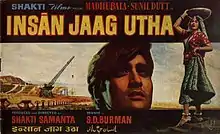| Insan Jaag Utha | |
|---|---|
 Theatrical release poster | |
| Directed by | Shakti Samanta |
| Written by | Nabendu Ghosh (screenplay) Vrajendra Gaur (dialogue) |
| Story by | Saroj Mitra |
| Produced by | Shakti Samanta |
| Starring | Madhubala Sunil Dutt Nasir Hussain Bipin Gupta Madan Puri |
| Cinematography | Chandu |
| Edited by | Dharamvir |
| Music by | Sachin Dev Burman Shailendra (lyrics) |
Release date |
|
| Country | India |
| Language | Hindi |
| Box office | est. ₹5.2 million |
Insan Jaag Utha (lit. 'Mankind has awoken') is a 1959 Hindi-language social drama film, produced and directed by Shakti Samanta, and written by Nabendu Ghosh and Vrajendra Gaur, based on a story by Saroj Mitra. The film stars Madhubala, Sunil Dutt, Nasir Hussain, Bipin Gupta and Madan Puri in lead roles. It has music by Sachin Dev Burman, with lyrics by Shailendra.
Plot
Gauri lives in a small village in India with her crippled ex-army-man and freedom fighter dad, Laxmandas, and a younger brother, Gulab, and makes a living working as a laborer. One day she notices a man lurking around their house, this man subsequently introduces himself as Ranjeet, who has just arrived from Bombay. Ranjeet and Gauri become friends after he treats a wound on Gauri's foot, and then both fall in love with each other. Ranjeet starts working for the Government which is in the process of building a dam, where Gauri also works. Ranjeet starts work as a laborer also, but is subsequently promoted as a crane operator. What Gauri and Laxmandas do not know is that Ranjeet is in this village for a reason - greed for the suitcase of gold that he himself had buried in Gauri's front-yard - the very same gold that he was caught smuggling five years ago and the very same gold that he had spent five years in prison for.
Cast
- Madhubala as Gauri
- Sunil Dutt as Ranjeet
- Nazir Hussain as Laxmandas
- Bipin Gupta as Minister
- Madan Puri as Mohan Singh
- Minoo Mumtaz as Muniya
- Sundar as Sukham
- Mauji Singh in the song (Baharon Se Nazaron Ke Dekho)
- Praveen Paul as Hotel Owner
- Nishi as Hansa / Riny
- Keshav Rana as Robert
- Shyam Kumar as Chander
- Kundan as Bahadur
Production
It was a tiring yet refreshing experience to get so close to nature and witness the lives of hundreds of people who are helping to build the new India.
Early in his career, Samanta had directed only crime thrillers including Inspector (1956) and Howrah Bridge (1958). A few days after the success of Howrah Bridge (1958), which was directed and also produced by him, he began working on Insan Jaag Utha. Insan Jaag Utha was a film with social and patriotic themes, and this was an attempt by Samanta to shift to making social films.[2] A large part of the film was shot on location at the Nagarjuna Saagar Dam, and the whole crew stayed in several guest rooms situated near the dam.[1]
Soundtrack
| Insaan Jaag Utha | ||||
|---|---|---|---|---|
| Soundtrack album by | ||||
| Released | 1959 (India) | |||
| Genre | Film soundtrack | |||
| Label | HMV now Sa Re Ga Ma | |||
| Producer | Sachin Dev Burman | |||
| Sachin Dev Burman chronology | ||||
| ||||
The soundtrack of the film was composed by S. D. Burman, with lyrics by Shailendra. It is noted for the duet Jaanu Jaanu Ri sung by Asha Bhosle and Geeta Dutt, which was shot on location at the under-construction Nagarjuna Sagar Dam.
| Song | Singer |
|---|---|
| "Aankhen Chaar Hote Hote" | Asha Bhosle |
| "Baharon Se Nazaron Ke" | Asha Bhosle |
| "Baat Badhti Gayi" | Asha Bhosle |
| "Jaanu Jaanu Ri, Kaahe Khanke Hai Tora Kangna" | Asha Bhosle, Geeta Dutt |
| "Chand Sa Mukhda Kyun Sharmaya" | Asha Bhosle, Mohammed Rafi |
| "Mehanatkash Insan Jaag Utha, Lo Dharti Ke Khwab Jage" | Asha Bhosle, Mohammed Rafi |
| "Yeh Chanda Rus Ka" | Mohammed Rafi |
Reception
Critical reception
Shoma A. Chatterjee of Upperstall found the film's storyline to be "powerful" and its songs to be "beautiful".[2] Filmfare had mentioned Madhubala's performance as Gauri in the film among her best performances.[3]
Box office
Insan Jaag Utha was a hit with audience and eventually emerged as the thirteenth highest-grossing film of 1959, taking ₹0.52 crore at the box office.[4] However, since the film was made on a big budget, its earning brought Samanta only a little profit. In an interview he gave several years after the film's release, he recalled Insan Jaag Utha as a "mediocre success".[5]
Discouraged by the little box-office returns of Insan Jaag Utha, Samanta shifted back to make entertainment-oriented, crime films for another decade, beginning with the highly successful Jaali Note (1960), before attempting the socially relevant film genre with films like Aradhana (1969), Kati Patang (1971) and Amar Prem (1971).[6]
References
- 1 2 Akbar, Katijia (1 April 2011). I Want to Live: The Story of Madhubala. Hay House, Inc. ISBN 978-93-81398-21-0.
- 1 2 Chatterji, Shoma A. (9 April 2016). "Shakti Samanta". Upperstall.com. Retrieved 31 January 2021.
- ↑ "Remembering Madhubala's best roles". filmfare.com. Retrieved 9 October 2020.
- ↑ "Highest Grossing Hindi Movies of 1959". IMDb. Retrieved 6 November 2020.
- ↑ "'In Aradhana, Sachin Karta Gave Me My Life's Biggest Hit': In Conversation with Shakti Samanta". Silhouette Magazine. 8 April 2016. Retrieved 31 January 2021.
- ↑ "Bollywood will miss wizard of entertainment Shakti Samanta". The Hindu. 10 April 2009. Retrieved 25 May 2013.
External links
- Insan Jaag Utha at IMDb
- Insan Jaag Utha on YouTube, Rajshri Films Official channel
- Insan Jaag Utha at Bollywood Hungama